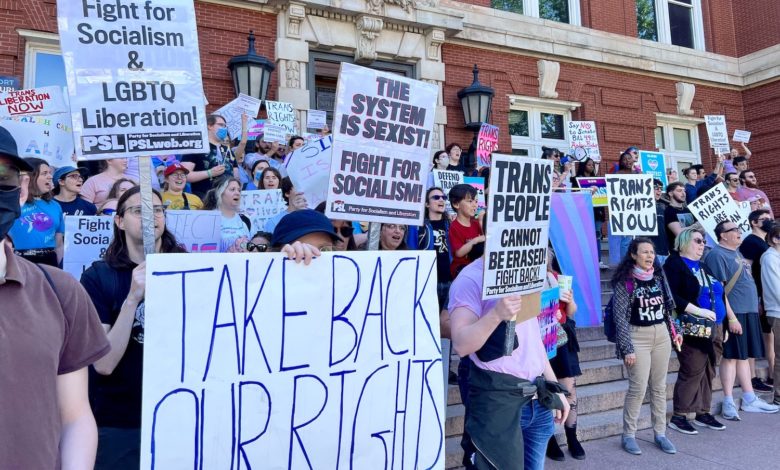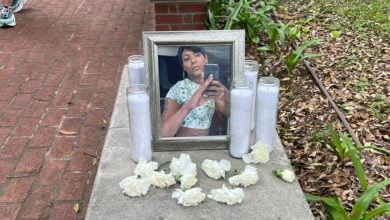
While transgender Missourians waited to see if an emergency ruling banning gender-affirming health care would be allowed by the state court, almost 350 people protested the ruling at Jefferson City’s State Capitol on April 29. The spirited crowd consisted of trans people, families and supporters. On the morning of May 1, just hours before the emergency regulation was set to go into effect, St. Louis Circuit Court Judge Ellen H. Ribaudo placed a hold on the regulations to hear further arguments, setting the new implementation date for May 15.
At question is an order issued by State Attorney General Andrew Bailey that would essentially block all gender-affirming health care even for transgender adults in the state. In order to receive gender-affirming care, Bailey’s order would require trans adults and their doctors to demonstrate that any diagnosed mental health conditions are “resolved,” that they are not influenced by “social media addiction or compulsion,” and they must follow a procedure to document any negative side effects of gender-affirming treatment for 15 years.
The order, if implemented, would go further than restrictive legislation currently being considered in Missouri that would prevent trans teenagers from receiving support and care including puberty blockers, a life-saving standard medical practice according to the American Medical Association and the American Academy of Pediatrics.
Trans activist Autumn Reynolds of Springfield pointed out that, “The attorney general’s order purposefully fails to define such terms as ‘social media addiction’ or describe how mental health conditions are to be ‘resolved.’ This vagueness is designed to intimidate medical practitioners and prevent them from providing any gender-affirming care to any trans people, including adults.”
The rally was organized in response to these actions and was initiated by the Party for Socialism and Liberation. Many organizations endorsed and participated, including Southwest Missouri Solidarity Network, Refuge Transgender Support Group, Democratic Socialists of America (St. Louis & Ozarks), Springfield Transgender and Ally Resource Team (START), Ekklesia Campus Ministry (MSU), Mid-Missouri Fellowship of Reconciliation, Human Rights Collective St. Louis, SEMO Pride Club, Young Communist League Springfield and The Ethical Society of St. Louis.
The rally started at the State Capitol where activists and concerned Missourians expressed solidarity with trans people and to demanded that they get the same right to medical care as everyone else. People also cheered in agreement when the fight for trans rights was connected to racism and sexism and fighting for systemic change.
“There’s people here who lived through the women’s movement of the 60s and the 70s who know that the fight was to say ‘biology is not our destiny,’ that women can be what they want to be, that men can be what they want to be, and that we do not need to enforce these strict, patriarchal gender norms,” stated Aviva Levine, a trans woman who traveled from her home in Chicago to support trans Missourians.
A Jefferson City woman and mother of a trans child, Jessi MP, said, “I am standing here as a mom, as a teacher, as a resident of this city, and a resident of this state. The state is letting us down. They are hurting my children, they are hurting your children, they are hurting you.” The young mother continued, “They started by coming for women’s rights, they didn’t stop at trans rights, and they’re not gonna stop now.”
PSL activist Amicia Huelsman of St. Louis debunked the claim that trans people are threats to children. “I have heard a lot of talk about how we are coming after kids, but that is a lie. I’m a teacher. My focus is on getting kids to care about chemistry and physics. I struggle in the classroom to make sure that learning is fun and that we are building up the next generation. I am openly trans at my job. No students have told me that they are trans now because they know that I have transitioned. No student has said that they are confused, or that they are uncomfortable. Instead, [my transition] has given my transgender students hope that they can be a part of society.”
Another common theme was the normality of the existence of trans people. Youth were the majority of those present. Miliana Sylvester, a Black 16-year-old junior from Springfield Central High School came with her 12-year-old sister. She said, “Trans youth are not new. They have been here, and now their voices are just louder and there are more people from every community here to support them.”
This writer, activist, trans woman, and trans support group facilitator of Springfield discussed letting go of the patriarchal norms that have been put upon trans people. “There is nothing wrong with who you are! … It is the system that is twisted and ugly and morally repugnant! … We trans people are but the latest target. The ruling class loves to set marginalized groups against each other so as to divide and conquer. In this way, they draw attention away from the inequity of the current system: a system where the few grow wealthy off the labor of the many. This is why it is vitally important to stand in solidarity with the entire working class and all marginalized people. Trans liberation goes hand in hand with not only queer liberation, but also Black and Brown liberation, immigrant liberation, indigenous liberation, women’s liberation — whether cis or trans — and liberation of people with disabilities.”
The crowd then marched to the governor’s mansion while chanting, “When trans people are under attack, what do we do? Stand up! Fight Back!” and “Gay, straight, Black, white! Unite, unite and fight the right!” Demonstrators voiced their disgust with Governor Mike Parson, who recently threatened to extend the legislative session if the House and Senate did not send him a bill to restrict trans rights.
Demonstrators then marched on to the Missouri Supreme Court, where the attorney general’s office is located. As the marchers continued their chants along the main stretch of downtown Jefferson City, diners and restaurant workers came out to cheer on the crowd. Upon arriving at the steps of the Supreme Court building, the chanting intensified. Keisha Messina from Springfield’s START organization later remarked that the chants were echoing off of the Capitol building across the street. “There’s no way anyone near there didn’t hear us,” Messina commented.
Gloria La Riva, 2020 PSL presidential candidate and coordinator for the Cuba and Venezuela Solidarity Committee, traveled to the rally from Kansas City, Kansas, where she was involved in a demonstration to demand justice for Black youth Amaree’ya Henderson, gunned down by Kansas City police. To cheers, she spoke of Cuba’s new Families Code and the fullest inclusion of all Cubans, including respect for LGBTQ people. La Riva concluded the rally saying, “This is beautiful, and this is more than we expected. But this shows us that we must never lose faith in the ability of people to know and fight for their rights and come together … It shows that we are the people and we have the power.”
Trans people await other actions in the Midwest and across the country that could impact their basic human right to determine their own health care along with their doctors. Kansas City, Mo., is considering a resolution which would make it a sanctuary city for trans people, in defiance of the pending regulation from the attorney general and proposed legislative action. Across the state line, the state of Kansas has passed the most extreme anti-trans bathroom bill in the United States.
Meanwhile, trans activists and allies vow to fight on. In the words of Mitch Schiller, activist and organizer with the ANSWER Coalition, “We need to continue. We have to keep pushing. We have to build organizations and fight for independent political power that isn’t tied to a handful of rich people on either side of our two-party system. We don’t want to just protect rights either. Right now we’re fighting just to maintain ground. We need to be on the offensive and need to expand rights.”





